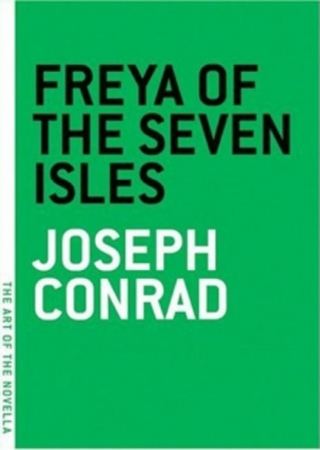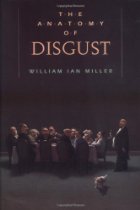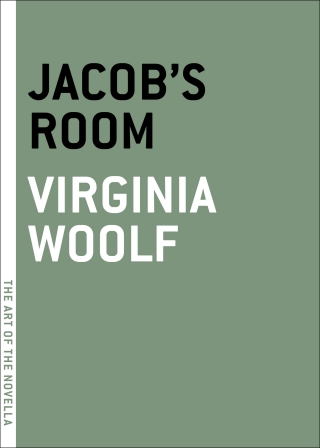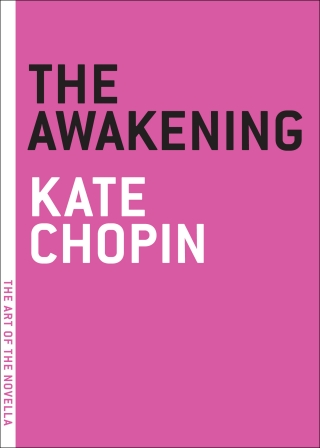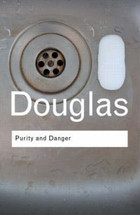
The most surprising thing about reading Mary Douglas's 1966 anthropological classic Purity and Danger: An Analysis of Concepts of Pollution and Taboo, was my sheer enjoyment of the thing. This is a theoretical work, written less for a lay audience than for Douglas's fellow cultural anthropologists, and yet her style is clean and lively, with barbs of wit to keep things interesting. ("This fashionable presentation," she quips at one point, "was supported by no evidence whatever.") As a result, it was far more entertaining than I had anticipated, and although Douglas's approach is now out of fashion for being overly rigid and/or simplistic, she introduced me to some ideas and dichotomies that will be worth thinking about during my ongoing disgust project. (On which subject, I haven't forgotten that second post on Mary Gaitskill's Veronica, but it occurred to me that the Douglas may be relevant to Gaitskill, so I thought I'd post on Douglas first.)
That said, there is a lot contained in this slim book, and I'm sorting out exactly what relation it may hold to analyzing disgust in non-ritual settings. Essentially, Douglas is writing about ritual cleanness and uncleanness, and the role that rituals of purity and pollution play in both "primitive" and "advanced" societies. Since her focus is on ritual cleanliness and pollution, she is only addressing certain kinds of situations in which disgust may or may not arise, and the disgust itself is not her main focus—something that makes William Ian Miller's dismissal of her points a bit unfair, in my opinion. Her overarching claim is that ritual pollution tends to reinforce the structure of a given society, defending the boundaries of that structure when they're threatened. As such (although this idea is more mine than Douglas's) the idea of pollution is fundamentally conservative, helping to maintain the status quo in the face of whatever forces may the threatening it.
For example, in one chapter she analyzes the esoteric food restrictions in the biblical book of Leviticus. Here the link with disgust seems relatively strong: foods forbidden the Israelites are described as unclean abominations, even when, to the casual reader, there seems little difference between them and the permitted foods. Following her usual pattern, Douglas first debunks a couple of previous schools of thought that attempted to explain the food prohibitions: she is satisfied neither by the idea that the prohibited foods are those associated with neighboring "heathen" clans (since the Israelites often incorporated foods and behaviors from their neighbors elsewhere), nor by the notion of an allegorical reading of these prohibitions (since it's possible for a reader to construct an allegorical reading of any combination of animals, and nothing of the sort is mentioned in the actual text). She neatly pokes holes in both theories, and is even more dismissive of the idea that these prohibitions rested on a pre-knowledge of modern hygienic requirements.
She suggests instead that the prohibited animals are those which exist at the uneasy boundaries of animal types, and which therefore are unclassifiable, seen as hybrid or monstrous. What makes her argument so persuasive, at least to this theological innocent, is that this is actually what the text itself says, whereas other interpretations are deductions away from textual evidence. For example, Leviticus specifically states that the category of animals which chew the cud and have cloven hooves are permitted for eating. If this is a distinct type of animal by the Hebrew classification system, then animals which have only one of these traits (cud-chewing or cloven hooves) would be seen as odd border-cases and possibly contaminating. And indeed, "unclean" animals include "the camel, the hare and the rock badger [hyrax], because they chew the cud but do not part the hoof...and the swine, because it parts the hoof but does not chew the cud." Similarly, animals which move by "swarming" are forbidden because the Hebrew word for "swarming" is an intermediate form of locomotion somewhere between walking and slithering, and can be applied to both earth-bound and water-bound creatures—disrupting more boundaries. Thus, in Leviticus,
[I}n general the underlying principle of cleanness in animals is that they shall conform fully to their class. Those species are unclean which are imperfect members of their class, or whose class itself confounds the general scheme of the world. (55)
Through declaring certain animals unclean for eating, the Leviticus author was helping to "create and control experience," (65), which Douglas argues is a key role for all ritual, both religious and secular. And indeed, she argues passionately that many of the dichotomies used by previous anthropologists working in this area are either totally misguided (the separation of "magic" from "religion," for example, which Douglas sees as residual Protestant bias against Catholics, and establishes a dichotomy unsupported by actual conversations with tribal people) or irrelevant to the questions she is asking. In both primitive and modern cultures, "dirt" occupies a similar systemic niche:
[D]irt is essentially disorder. There is no such thing as absolute dirt: it exists in the eye of the beholder. If we shun dirt, it is not because of craven fear, still less dread or holy terror. Nor do our ideas about disease account for the range of our behaviour in cleaning or avoiding dirt. Dirt offends against order. [...] For I believe that ideas about separating, purifying, demarcating and punishing transgressions have as their main function to impose system on an inherently untidy experience. (2 - 4)
Thus ritual, and the ideas of purification and cleanliness, hold power to impose order against the threatening chaos. Despite Miller's complaints against Douglas, this is essentially the flipside of his own argument: he claims that a major component of our experience of disgust is a confrontation with the ever-changing, chaotic flux of "life soup," itself the perfect symbol of Douglas's "essential disorder." Yet "life soup" also holds huge amounts of power and potential—in fact, one of the threatening things about it is that it reminds each of us that our bodies and brains are only temporary organizations of matter. In the chapter "Power and Danger," Douglas analyzes this idea on the level of social structures:
Granted that disorder spoils pattern; it also provides the materials of pattern. Order implies restriction; from all possible materials, a limited selection has been made and from all possible relations a limited set has been used. So disorder by implication is unlimited, no pattern has been realised in it, but its potential for patterning is infinite. This is why, though we seek to create order, we do not simply condemn disorder. We recognise that it is destructive to existing patterns; also that it has potentiality. It symbolises both power and danger. (94)
She goes on to elucidate who, in a given society, is likely to be endowed with the conscious use of the power of disorder (often termed witchcraft or sorcery), and who is likely to be thought to inflict the danger of disorder unconsciously. This section seems particularly relevant to Veronica and to modern disgust in general, since our disgust is so often directed toward those in the margins (homo- and bisexuals; the homeless; the visibly mentally ill), and their contagion is often felt to endanger those around them without any conscious malicious effort on their part. This accords with Douglas's analysis: in the tribal cultures she cites, conscious and directed use of sorcery is usually associated with those who possess structural power: chieftans, kings, patriarchs. The magic associated with those on the structural margins is often thought to emanate from them without their conscious intention. In this passage, which strikes me as profoundly relevant to Mary Gaitskill, Douglas moves from general points to a discussion of Maori boys undergoing an initiation rite into adulthood:
Danger lies in transitional states, simply because transition is neither one state nor the next, it is undefinable. The person who must pass from one to another is himself in danger and emanates danger to others. The danger is controlled by ritual which precisely separates him from his old status, segregates him for a time and then publicly declares his entry into his new status. [...] To behave anti-socially is the proper expression of [the Maori boys'] marginal condition. To have been in the margins is to have been in contact with danger, to have been at a source of power. (96-97)
I'm drawn to this idea of the disordered margins (source of so much of the disgusting) as both dangerous and powerful or compelling. And it's not just people passing through one stage of life into another: those who occupy ambiguous or double roles in a social structure are sometimes thought to be sources of dangerous pollution by the mere fact of their existence. Douglas brings up a number of examples in which groups or individuals who in practice hold some level of unacknowledged or uncertain power (Kachin wives, Jews in England, Joan of Arc, or the serf-like Mandari "clients," all of whom occupy uneasy, intermediate power positions) are thought to be involuntary sources of witchcraft.
[The witchcraft] may lie dormant as they live their life peacefully in the corner of the sub-system in which they are intruders. But this role is in practice difficult to play coolly. If anything goes wrong, if they feel resentment or grief, then their double loyalties and their ambiguous status in the structure where they are concerned makes them appear as a danger to those belonging fully in it. It is the existence of an angry person in an interstitial position which is dangerous, and this has nothing to do with the particular intentions of the person. (102, emphasis mine)
"An angry person in an interstitial position": surely a useful formula to keep in mind.
There are certainly problematic elements in Purity and Danger. Probably the section which gave me the most pause was Chapter 5, "Primitive Worlds," in which the author searches for a principle to distinguish "primitive" societies from those properly classed "advanced." And there's a reason I've used some variation of the word "structure" so many times in this post: Douglas is a proponent of high anthropological Structuralism, which has since fallen out of favor for its reductionism and simplification of human societies. She herself is not unconscious of these criticisms, though, and does address them in the book. And although her Anglo-centrism is grating at times to a modern ear—when she uses the word "we" it is always synonymous with English Protestant, as if she expects that these will be her only readers—she also makes a genuine and respectable effort to demolish many of the more egregious assumptions made by early 20th-century anthropologists and psychologists about "primitive" peoples. Her chapter debunking psychology's equation of primitive rituals with infant and childhood stages of development is particularly scathing. So, as I said, surprisingly enjoyable as well as very thought-provoking.
I am left with some questions vis-à-vis Douglas and my own project. Principally, what is the relationship between a person in a ritual state of pollution, a person who is disgusted, and a person who is (to some third party) disgusting? Is pollution synonymous with, or totally unrelated to, disgust? Obviously, given that I've spent this long writing about Douglas, I don't believe the two are irrelevant to one another, but neither do I believe they're identical. For one thing, pollution as Douglas is describing it is almost by definition a codified element of a social structure. Whereas the circumstances of the disgust emotion are socially constructed as well, it's not formalized in the same way, and it seems to me more individualized as well. There are things whole societies will find disgusting—indeed, there are things almost all humans, cross-culturally, find disgusting—but there are also many idiosyncratic quirks to the disgust reactions of individuals. There's no equivalent of Leviticus to tell us what's disgusting and what's not. In any case, teasing out exactly which of Douglas's writings on pollution are relevant to disgust, and what the relationship between the two might be, will be interesting fodder for future thought. In the meantime, I can't resist closing with one more quote, this one from Douglas's rich final chapter, examining rituals in which dirt and filth are sometimes re-contextualized as creative, positive forces. Those concerned about finding Douglas insensitive to the complexity of human society should rest easy:
Of course, the yearning for rigidity is in us all. It is part of our human condition to long for hard lines and clear concepts. When we have them we have to either face the fact that some realities elude them, or else blind ourselves to the inadequacy of the concepts.
The final paradox of the search for purity is that it is an attempt to force experience into logical categories of non-contradiction. But experience is not amenable and those who make the attempt find themselves led into contradiction. (162)


